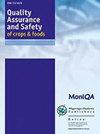二苯乙烯通过激活AMPK信号通路促进H2O2抑制的MC3T3-E1细胞的成骨分化
IF 5.3
3区 农林科学
Q1 FOOD SCIENCE & TECHNOLOGY
引用次数: 0
摘要
骨质疏松症是一种常见的退行性骨骼疾病,其主要机制是骨吸收和骨形成之间的失衡。目前,骨发育过程中基因水平信号通路的密切协调是骨质疏松症研究的热点。本研究的重点是pterostilbene是否对过氧化氢(H2O2)诱导的成骨细胞凋亡和氧化应激具有保护作用,并揭示了相关的潜在机制。培养MC3T3-E1成骨细胞,并用不同浓度的H2O2(0–1 mM)连同或不连同pterostilbene处理,并应用MTT法或Annexin V-FITC/碘化丙啶染色来测量细胞活力和凋亡。采用2,7-二氯二氢荧光素双乙酸酯法和谷胱甘肽过氧化物酶和丙二醛酶联免疫吸附血清学法进行体外细胞抗氧化分析。此外,通过茜素红S染色进行细胞碱性磷酸酶活性测定。进行蛋白质印迹分析以确定成骨相关标志物的表达水平,包括I型胶原、骨桥蛋白、runt相关转录因子2和5'腺苷一磷酸激活蛋白激酶(AMPK)信号通路相关蛋白。关键发现,紫檀烯能减轻H2O2诱导的细胞凋亡和氧化应激。二苯乙烯还通过激活AMPK途径促进H2O2处理的MC3T3-E1细胞的成骨分化。总之,pterostilbene阻断了H2O2诱导的MC3T3-E1细胞功能障碍,表明其有可能成为治疗骨质疏松症的一种有前景的药物。本文章由计算机程序翻译,如有差异,请以英文原文为准。
Pterostilbene promotes the osteogenic differentiation of MC3T3-E1 cells inhibited by H2O2 by activating the AMPK signaling pathways
Osteoporosis is one of the common degenerative skeletal diseases whose essential mechanism is the imbalance between bone resorption and formation. Currently, the close coordination of signaling pathways at genetic level during bone development is a hot topic of osteoporosis research. The present study is focused on whether pterostilbene protects against hydrogen peroxide (H2O2)-induced osteoblastic cell apoptosis, oxidative stress, and reveals the related underlying mechanisms. MC3T3-E1 osteoblastic cells were cultured and treated with different concentrations of H2O2 (0–1 mM) along with or without pterostilbene, and MTT assay or Annexin V-FITC/propidium iodide staining was applied for measuring cell viability and apoptosis. The in vitro cellular antioxidant analysis was performed using 2,7-dichlorodihydrofluorescein diacetate assay and enzyme-linked-immunosorbent serologic assay against glutathione peroxidase and malondialdehyde. In addition, cellular alkaline phosphatase activity was executed by Alizarin Red S staining. Western blot assay was conducted to determine the expression levels of osteogenic-related markers, including type I collagen, osteopontin, runt-related transcription factor 2, and the 5' adenosine monophosphate-activated protein kinase (AMPK) signaling pathways related proteins. The key finding was that pterostilbene could attenuate the H2O2-induced cellular apoptosis and oxidative stress. Pterostilbene also promoted osteogenic differentiation in H2O2-treated MC3T3-E1 cells through activation of the AMPK pathway. In conclusion, pterostilbene blocked the H2O2-induced MC3T3-E1 cells dysfunction, indicating its potential to be a promising medication for treating osteoporosis.
求助全文
通过发布文献求助,成功后即可免费获取论文全文。
去求助
来源期刊

Quality Assurance and Safety of Crops & Foods
FOOD SCIENCE & TECHNOLOGY-
CiteScore
4.60
自引率
7.50%
发文量
61
审稿时长
1 months
期刊介绍:
''Quality Assurance and Safety of Crops & Foods'' is an international peer-reviewed journal publishing research and review papers associated with the quality and safety of food and food sources including cereals, grains, oilseeds, fruits, root crops and animal sources. It targets both primary materials and their conversion to human foods. There is a strong focus on the development and application of new analytical tools and their potential for quality assessment, assurance, control and safety. The scope includes issues of risk assessment, traceability, authenticity, food security and socio-economic impacts. Manuscripts presenting novel data and information that are likely to significantly contribute to scientific knowledge in areas of food quality and safety will be considered.
''Quality Assurance and Safety of Crops & Foods'' provides a forum for all those working in the specialist field of food quality and safety to report on the progress and outcomes of their research.
 求助内容:
求助内容: 应助结果提醒方式:
应助结果提醒方式:


